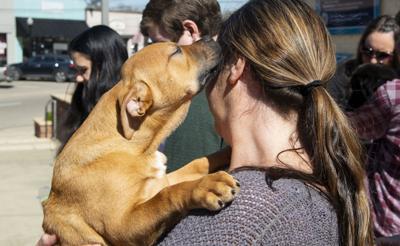Pet parents will soon have a chance for a low cost rabies vaccination for their pet children.
As part of his role as Elmore County rabies officer, Dr. John Kelliher of Camellia Veterinary Hospital, has taken on the county rabies clinic after the retirement of Dr. William Welch. Part of the duties of the rabies officer is to help organize a low cost rabies vaccination clinic.
“We will travel around to four different stops in the county,” Camellia Veterinary Hospital office manager Catherine Monson said. “We tried to spread it out as much as we could so it would be as convenient as possible for more Elmore County pet owners.”
May 24, the clinic will be at the Titus Co-Op at 17560 U.S. Highway 231 in Titus from 1 to 3:30 pm. It will then move to Stanhope Elmore High School from 3:30 to 5:30 p.m.
Then on May 31, the clinic will be at Wetumpka High School from 1 to 3 p.m. and move to Elmore County High School from 3:30 to 5:30 p.m.
The cost is $12 per animal for a one-year vaccine. The mobile clinic will accept cash or credit card.
Dogs are required to be on leashes and cats in carriers.
According to the Alabama Department of Public Health, rabies is a deadly viral disease that infects the brain and spinal cord of mammals.
“The virus is spread from exposure to saliva or nervous tissue from an infected animal, usually through a bite,” ADPH said on its website. “Scratches or saliva contact with a mucous membrane are also considered exposure risks. Rabies is preventable if proper treatment is given before symptoms occur, but is fatal once symptoms are present.”
ADPH said in Alabama, there are two different strains of rabies virus: the raccoon variant and the bat variant.
“The raccoon strain can infect other wildlife, such as foxes, coyotes and skunks; but more importantly, it can infect people's pets,” ADPH said. “Vaccination of dogs, cats and ferrets is required by law. Vaccinating animals helps ensure protection should they unknowingly be exposed to a rabid animal.”
ADPH said the bat variant can also infect pets or people. Bats present a unique risk of rabies because their bites may be unknown or leave insignificant marks. If you should have bats in your house or bedroom, please contact your physician or local health department for consultation.
ADPH offers these quick steps for preventing the spread of rabies.
• Avoid being bitten or scratched. Get medical attention immediately and report to the local health department.
• Don't approach stray or injured animals or wildlife.
• Don't handle bats.
• Keep your pets and livestock vaccinated.
• Keep pets properly confined or on leashes.
• Avoid leaving trash or leftover pet food uncovered, which may attract wildlife.




